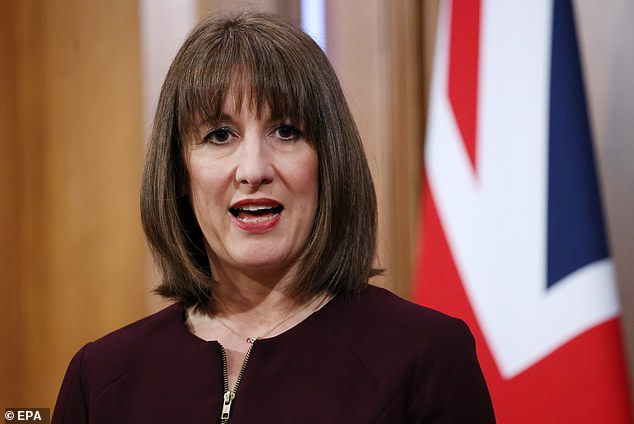[ad_1]
There are times when the numbers published by the Office for National Statistics on the state of the economy are so mind-boggling that they become meaningless.
Figures for June on the level of government borrowing are a case in point. On our behalf, Labour borrowed some £20.7billion last month – £6.6billion more than in the same month last year.
It is the second highest June borrowing since records began, and was only eclipsed in 2020 at the height of the pandemic.
This takes borrowing in the first three months of the financial year to £57.8billion, and if the forecasts are to be believed, suggests the total tally for this financial year will be £130billion, give or take a billion or two.
That is more than any government department spends, other than health.
Perhaps an extra £6billion a month doesn’t sound too much. But here’s a way of putting these numbers into some sort of perspective.

Maxed out: Chancellor Rachel Reeves (pictured) has watched gilt yields on the 30-year benchmark government bond hit 5.5% last week – far higher than during the Liz Truss reign
How long do you think it takes to count to a million? If you take one number at a time – about a second each – it would take an average person 11 and a half days of continuous counting, or around 278 hours.
Now estimate how long it takes to count to a billion. On the same non-stop basis, it would take someone an astonishing 31.7 years, and that’s without eating or sleeping.
So for June’s extra £6billion, someone would have to count for roughly 192 years. That gives some context for the scale of the problems facing our public finances.
If the economy was growing – and living standards rising – as a consequence of improved productivity, such a whopping debt mountain might not be such a problem. But it’s not. Quite the reverse.
June’s horrifying monthly increase is because government spending outstripped tax receipts while the cost of interest payments on the country’s nearly £3 trillion debt nearly doubled.
What’s more, the £16.4billion cost of interest payments on the debt was the second highest for June since 1993 due to inflation.
This was £8.4billion more than in the same month last year, or put another way, £550million a day and more than £22million an hour.
As Office for Budget Responsibility chairman Richard Hughes pointed out recently at the Treasury select committee, we have the sixth-highest debt, fifth-highest deficit and third-highest borrowing costs among 36 advanced economies.
Which is why the UK gilt market is so skittish. Traders smell trouble ahead, particularly after the Government failed to get through even the most minor reforms to the welfare budget.
Gilt yields on the 30-year benchmark government bond have been above 5 per cent for most of the year, breaking the 5.5 per cent mark last week – far higher than during the Liz Truss reign.
Yet when Labour came to power, yields were below 4.5 per cent. Capital Economics claims that higher UK gilt yields since March have already cut the Chancellor’s so-called ‘fiscal headroom’ from £9.9billion to £6.7billion.
In the scale of things, the difference now comes down to a rounding error.
While it is true that the cost of money has risen globally, the markets forecast that UK borrowing costs have further to climb, that the country is an outlier.
What a mess. Rachel Reeves will need to whip up another £20billion to balance the books. But she doesn’t have many options left, having lost the fight over cuts to the welfare budget.
Her only choice is to raise taxes again. This in turn will scupper growth, leading to a state of stasis, if not a full-blown financial crisis.
Trump’s win
Laugh all you like at Donald Trump’s outlandish tariff threats but they often land him the prize.
The President’s latest win is the promise by AstraZeneca to invest $50billion in the US by the end of the decade as part of its plan to reach $80billion of sales.
Rather than face potential tariffs of 200 per cent on imported drugs, the pharmaceuticals giant is going to build a new drug manufacturing factory for chronic diseases in Virginia.
Having already lost out on AstraZeneca’s plan to build a plant in the UK because of government incompetence, the powers that be must do all they can to ensure that the company will keep its primary listing in London and not switch to New York.
That would be giving Trump too much of a win.
DIY INVESTING PLATFORMS

AJ Bell

AJ Bell
Easy investing and ready-made portfolios

Hargreaves Lansdown

Hargreaves Lansdown
Free fund dealing and investment ideas

interactive investor

interactive investor
Flat-fee investing from £4.99 per month

InvestEngine

InvestEngine
Account and trading fee-free ETF investing
Trading 212
Trading 212
Free share dealing and no account fee
Affiliate links: If you take out a product This is Money may earn a commission. These deals are chosen by our editorial team, as we think they are worth highlighting. This does not affect our editorial independence.
[ad_2]
This article was originally published by a www.dailymail.co.uk . Read the Original article here. .

